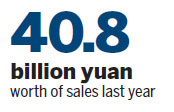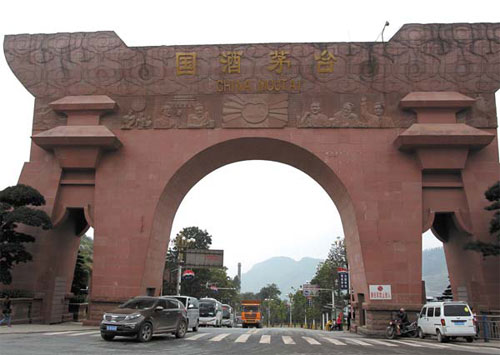Moutai adapts to loss of its traditional buyers
When Chinese President Xi Jinping launched the anti-graft and austerity campaign in December 2012, analysts warned about the negative side effects that the initiative would have on the economy, as companies that catered for big spenders were bound to feel the pinch.
Among the corporations they forecast would feel the pinch was Kweichow Moutai Co Ltd, the manufacturer of China's most famous white spirit Moutai.
Traditionally, the high-end liquor has been a favorite at State banquets and Party celebrations.
Therefore, it was only natural for the company to suffer from the leadership's efforts to prevent wasteful government spending.
However, Kweichow Moutai has been coping reasonably well after the government's ban on excessive spending, helped by a change of strategy. The company has opted to increase its customer base by lowering prices and strengthening its marketing channels to adapt to the changing times.
Now the company says it pays special attention to marketing, especially targeting new customers. The strong sorghum-based liquor now runs TV and newspaper advertisements, whereas previously it relied solely on prestige.
"In recent years, the company has made a transformation to target more business people and younger consumers. And the move has had a positive effect," Yuan Renguo, Kweichow Moutai's chairman, said at the liquor's birthplace Maotai in Guizhou province.
When the anti-corruption campaign started, Moutai registered revenues of 40.2 billion yuan ($6.56 billion).
Last year, the company posted sales of 40.8 billion yuan, reflecting a steady increase.
However, the producer of the fiery liquor notes that this year sales will see a significant spike. In the first three months of 2015, Moutai has already raked in 11 billion yuan in sales, a 33 percent improvement on the year before.
"The anti-corruption campaign has had an effect on Kweichow Moutai, but this is only temporary," said Tina Zhou, executive director at luxury market consulting firm Fortune Character Group.
"Consumption by Party officials and gift giving represent only a minor part of the company's revenue, while personal consumption has become the main source of its sales."
Under the planned economic system, the high-end drink was supplied mainly to a small group of people, while ordinary people had few chances to taste the white liquor.
However, as China became a market economy, the drink became available to a greater number of consumers.
Rupert Hoogewerf, chairman and chief researcher at the luxury publishing and events group Hurun Report said: "Moutai has been one of the most symbolic brands of China's austerity campaign. Until two years ago, the prices of the drink had been gradually rising but with the introduction of the campaign, we have witnessed a decline in prices."
In the past, Moutai was accused of being priced beyond the reach of average consumers. But the company no longer wants Moutai to be perceived as a luxury brand. In order to fight the perception it is an unattainable product, the company has introduced new product varieties at cheaper prices.
"Kweichow Moutai's decision to produce low-end products has two purposes. First, to tell consumers that it is not a luxury brand but a populist one. The second reason is to counteract revenues and profit decline resulting from the anti-graft campaign," said Zhou of Fortune Character Group.
Meanwhile, a bottle of the company's most famous product, the 53-degree Flying Fairies, is selling at lower prices in the market. In 2014, the price of the high-end liquor averaged 1,300 yuan a bottle, down 32.6 percent compared to an average of 1,900 yuan in 2013, according to the Luxury Consumer Price Index 2014 published by the Hurun Report.
Despite the expensive price tag of its most popular product Flying Fairies, a bottle of the luxury spirit is still regarded as a high-end gift for special occasions and holidays in China. And it is normal for speculative trading to happen before China's annual peak period for alcohol consumption during the Lunar New Year holiday.
The company says it has no control over this. It said that this year it set an ex-factory price for a bottle of Flying Fairies at 819 yuan. But this price can be as much as tripled by independent sellers during the most popular Chinese festivities.
So although the drink has become more affordable, it still remains too expensive for average workers.

Mao Yuan, the owner of a small local independent liquor producer in Maotai town said: "Most of our consumers are low-end buyers, predominantly employees of the Moutai distillery and migrant workers that come back home from Guangdong province." The bottles of the baijiu made by her family business named Mao Zhengyuan start at 40 yuan.
But even if prices of the star product skyrocket during certain periods of the year, the drink remains very popular among the most affluent consumers in the country and China's growing middle class. "People in China like to drink Moutai. At a luxury consumer level, the white liquor remains the preferred choice for the Chinese elite," said Hoogewerf of Hurun Report.
Some alcohol auctions have shown that vintage bottles of Moutai can reach exorbitant prices in the market.
In September 2011, a bottle of Flying Fairies Moutai produced in 1966 was auctioned for 300,000 yuan, setting a record for China's liquor auctions. In December, a bottle of Chennian Moutai produced in 1958 was auctioned for 552,000 yuan, another record in the market.
A bottle of Moutai can retain its flavor and properties for about 20 years, workers at the Moutai distillery said.
emmagonzalez@chinadaily.com.cn
|
The liquor Moutai is now synonymous with the town in Guizhou province where it is produced. |
(China Daily 05/05/2015 page7)















